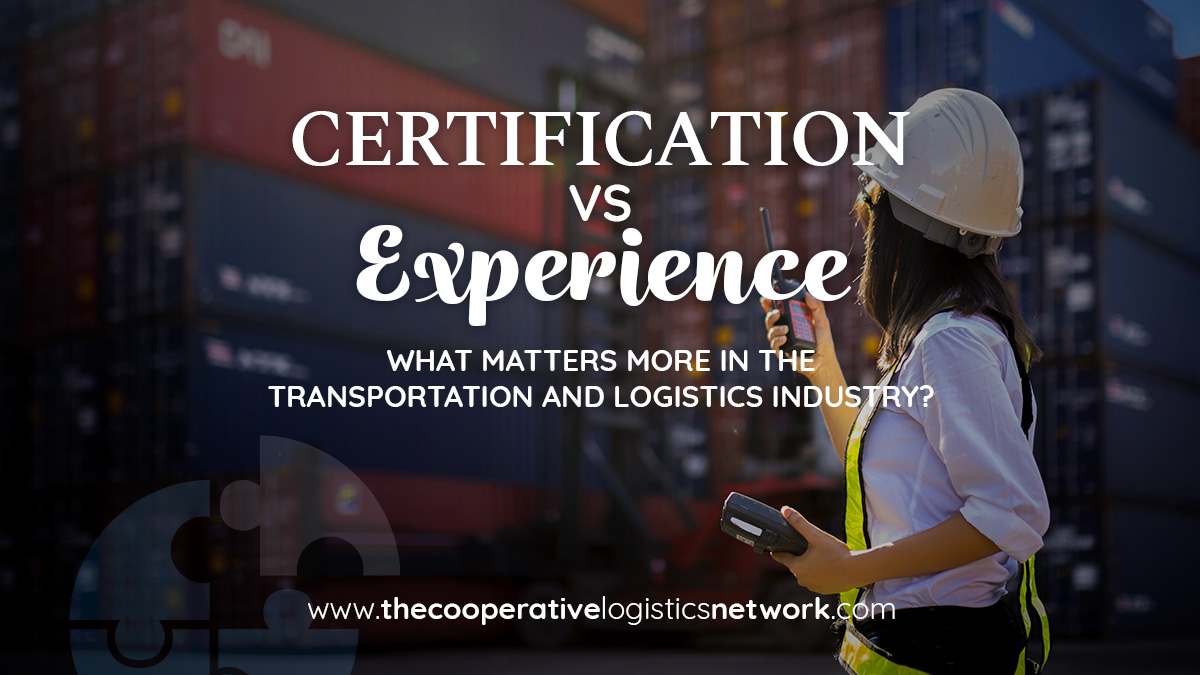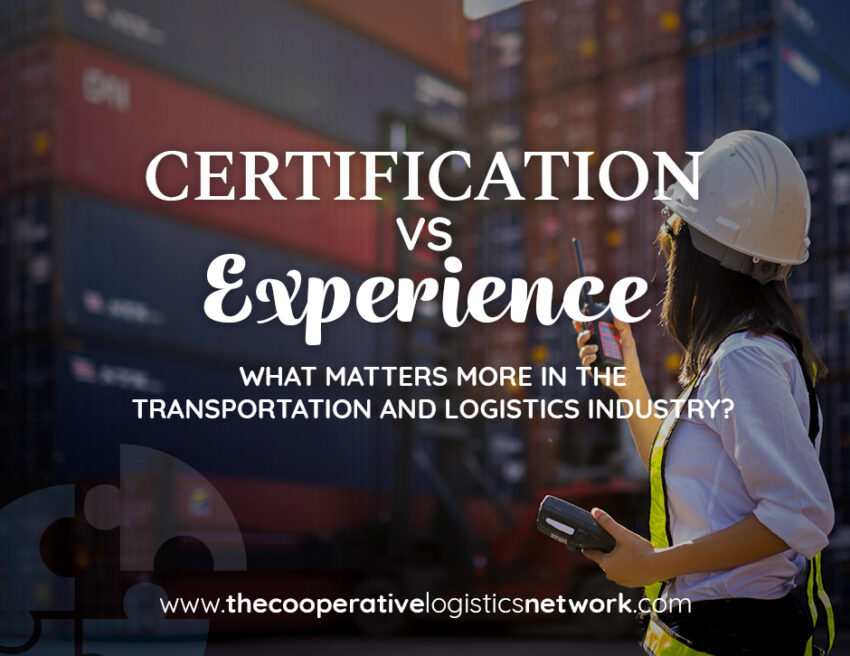The Classic Debate: Experience vs. Certification
For decades, logistics has been a hands-on business. Professionals learned on the job—navigating customs procedures, solving real-time shipping crises, building supplier relationships, and managing inventory the old-fashioned way. Experience was king.
But over the last decade, a shift has taken place. Supply chain disruptions, digitalization, and regulatory complexity have created a demand for certified knowledge. Today, more freight forwarders, supply chain managers, and logistics professionals are seeking certifications to validate their skills, and more companies are requiring them as a baseline for hiring.
So, what does this mean in real terms?
Experience still offers deep, situation-based learning. Someone who’s navigated cross-border crises or solved last-minute cargo hiccups often has insights no textbook could provide. But certifications offer structure, standardization, and assurance that someone has learned the global best practices—from Incoterms and HS codes to sustainability standards and customs compliance.
Why Certifications in the Transportation and Logistics Industry Are Gaining Ground
Several factors are driving the growing importance of certifications in transportation and logistics industry:
1. Globalization and regulation:
As logistics becomes more global, companies need team members who understand international compliance, customs laws, and trade agreements. Certifications from organizations like FIATA, IATA, or CILT ensure that candidates have the required technical knowledge.
2. Tech-driven transformation:
From AI-powered route optimization to blockchain-based inventory tracking, logistics today requires technical fluency. Certifications now cover digital logistics platforms, data analytics, and automation—skills that even experienced professionals may not have acquired on the job.
3. Standardization and trust:
Hiring managers and global clients often rely on certifications to assess trustworthiness, especially when experience can’t be easily verified across countries or companies. Certifications provide a standardized measure that signals quality and expertise.
4. Competitive advantage:
In today’s crowded logistics market, having certified staff can differentiate a freight forwarder from the competition. It communicates investment in training, compliance, and excellence—especially important when working with Fortune 500 clients or on high-value projects.
Certifications in Logistics Industry: Not Just for Newcomers
A common misconception is that certifications are only for newcomers. That’s no longer the case. Even experienced freight forwarders and supply chain managers are going back to school—virtually and in person—to earn credentials in areas like:
-
Green logistics and sustainability
-
Digital supply chain management
-
Risk assessment and customs compliance
-
Warehouse automation and robotics
-
Dangerous goods handling
The reason? The logistics landscape is changing faster than ever. Clients now expect sustainable practices, real-time tracking, and advanced risk mitigation. Certifications provide a way to stay relevant, informed, and prepared for what’s next.
The Future of Logistics Certifications: How AI, Green Logistics, and Tech Are Shaping New Standards
Looking ahead, certifications in logistics industry are becoming more future-focused and tech-integrated.
AI and machine learning are transforming logistics—from predictive delivery windows to autonomous freight handling. Certifications that include AI literacy or data interpretation are becoming essential for mid- and senior-level professionals.
Meanwhile, green logistics is no longer optional. Freight forwarders and 3PLs are under pressure to measure and reduce their carbon footprint. Certifications in sustainability and carbon accounting are already being offered by FIATA and other institutions to help companies align with ESG (Environmental, Social, and Governance) standards.
Tech is also driving logistics training into the digital era. E-learning platforms, interactive simulations, and AI-powered learning assistants are making certification programs more accessible and engaging.
The result? Professionals can stay current without pausing their careers, and companies can upskill teams at scale—creating a workforce that’s both experienced and formally trained.
Digital Badges and Online Credentials: Are They the Future of Logistics Training?
Enter digital badges—a fast-rising trend in professional development.
Unlike traditional diplomas or paper certificates, digital badges are verified, clickable credentials that can be displayed on LinkedIn, digital resumes, or company websites. They often come with metadata showing the issuing institution, the date, the skills mastered, and even a link to the exam or project completed.
This model of micro-credentialing is ideal for logistics professionals who want to showcase specialized skills—like cold chain logistics, e-commerce fulfillment, or SAP warehouse systems—without enrolling in lengthy programs.
In 2025, many freight forwarders are using platforms like Coursera, edX, and LinkedIn Learning to earn badges recognized by supply chain associations and logistics tech companies. These micro-credentials help employees stay agile, while companies use them to build a culture of continuous learning. It’s also a response to how learning is changing. In a dynamic industry like logistics, waiting six months for a course to finish may not be practical. Digital credentials offer immediate recognition, are shareable online, and integrate well with corporate training ecosystems.
For example, enrolling for The Cooperative Logistics Network’s certification courses provided by CIFFA could help your team adopt new work models and master different aspects of the supply chain. A well-trained workforce is definitely better placed to cope with the threat from the competition. It allows logistics professionals to secure a strong position in this sector.
Striking the Right Balance
Ultimately, the question isn’t “certification or experience?”—it’s how to balance both. Companies that only value experience risk becoming outdated in a digital-first supply chain environment. On the flip side, hiring purely based on certifications can backfire if the person lacks real-world problem-solving or customer service skills. The most forward-thinking logistics organizations are combining both approaches:
-
Hiring experienced professionals and supporting them in earning new certifications
-
Using certifications to onboard and upskill junior staff
-
Creating in-house learning paths that combine mentorship with digital training
This blended model acknowledges that while experience teaches context and adaptability, certifications in logistics industry ensure consistency, accountability, and modern know-how.
Final Thoughts: Certification, Experience, or Both?
In 2025, the logistics industry doesn’t just reward those who’ve “been there, done that.” It favors professionals who continuously learn, adapt, and grow. If you’re a logistics professional, consider certifications not as a replacement for your experience—but as an amplifier of it. They show clients, colleagues, and employers that you’re serious, skilled, and future-ready.
And if you’re leading a logistics company, supporting both on-the-job training and formal certification programs is the smartest investment you can make. The freight forwarders of tomorrow will be those who blend years of practical wisdom with cutting-edge knowledge—and wear both with pride. Because in today’s logistics industry, it’s not certification versus experience—it’s how well you combine the two to stay ahead.



